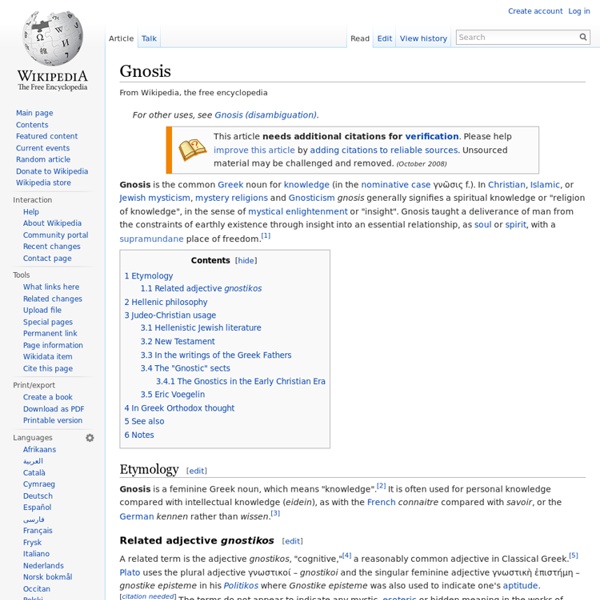Chaos magic
The chaosphere is a popular symbol of chaos magic. Many variants exist. For more, see Symbol of Chaos. General principles[edit] Chaos magicians are often seen by other occultists as dangerous or worrisome revolutionaries.[2] History[edit] Origins and creation[edit] This magical discipline was first formulated in West Yorkshire, England in the 1970s.[4] A meeting between Peter J. Influences[edit] Following Spare's death, magicians continued to experiment outside of traditional magical orders. Early days[edit] The first edition of Liber Null does not include the term "chaos magic", but only refers to magic or "the magic art" in general.[6] Texts from this period consistently claim to state principles universal to magic, as opposed to a new specific style or tradition of magic, and describe their innovations as efforts to rid magic of superstitious and religious ideas. Chaos came to be part of this movement defined as "the 'thing' responsible for the origin and continued action of events[...].
Agnostizismus
Agnostizismus (latinisierte Form von griechisch ἀγνωστικισμός a-gnōstikismós von altgriechisch ἀγνῶσις a-gnō̂sis, deutsch ‚ohne Wissen‘, ‚ohne Erkenntnis‘) ist die philosophische Ansicht, dass Annahmen – insbesondere theologische, die die Existenz oder Nichtexistenz einer höheren Instanz, beispielsweise eines Gottes, betreffen – ungeklärt oder nicht klärbar sind.[1] Vertreter des Agnostizismus werden als Agnostiker bezeichnet. Agnostizismus ist eine Weltanschauung, die insbesondere die prinzipielle Begrenztheit menschlichen Wissens, Verstehens und Begreifens betont. Die Möglichkeit der Existenz transzendenter Wesen oder Prinzipien wird nicht bestritten. Agnostizismus ist sowohl mit Theismus als auch mit Atheismus vereinbar, da der Glaube an Gott und die Ablehnung von Gott möglich ist, selbst wenn die Gewissheit seiner Existenz oder Inexistenz fehlt. Ebenso ist die Auffassung, wonach atheistische Thesen wahrscheinlicher sind als theistische, mit dem Agnostizismus vereinbar. Im 20.
Agnosticism
Agnosticism is the view that the truth values of certain claims—especially claims about the existence or non-existence of any deity, as well as other religious and metaphysical claims—are unknown or unknowable.[1][2][3] According to the philosopher William L. Rowe, in the popular sense, an agnostic is someone who neither believes nor disbelieves in the existence of a deity or deities, whereas a theist and an atheist believe and disbelieve, respectively.[2] Thomas Henry Huxley, an English biologist, coined the word agnostic in 1869. However, earlier thinkers have written works that promoted agnostic points of view. These thinkers include Sanjaya Belatthaputta, a 5th-century BCE Indian philosopher who expressed agnosticism about any afterlife,[4][5][6] Protagoras, a 5th-century BCE Greek philosopher was agnostic about the gods.[7] The Nasadiya Sukta in the Rigveda is agnostic about the origin of the universe.[8][9][10] Defining agnosticism[edit] Thomas Henry Huxley said:[11][12] Robert G.
Life sciences
The life sciences comprise the fields of science that involve the scientific study of living organisms – such as microorganisms, plants, animals, and human beings – as well as related considerations like bioethics. While biology remains the centerpiece of the life sciences, technological advances in molecular biology and biotechnology have led to a burgeoning of specializations and interdisciplinary fields.[1] Some life sciences focus on a specific type of life. The life sciences are helpful in improving the quality and standard of life. There is considerable overlap between many of the topics of study in the life sciences. Topics of study[edit] Affective neuroscience[edit] Anatomy[edit] Sagittal MRI scan of the head Astrobiology[edit] Biochemistry[edit] A schematic of hemoglobin. Biocomputers[edit] Biocomputers use systems of biologically derived molecules, such as DNA and proteins, to perform computational calculations involving storing, retrieving, and processing data. Biocontrol[edit]
10+ Visitenkarten die Ihr Unternehmen lange in Erinnerung halten
Guerilla Marketing Visitenkarten Visitenkarten sind das Aushängeschild eines Unternehmens. Schon mit dem einfachsten aller Werbemittel, mit der Visitenkarte können sie ihren Kunden ihre Individualität und ihre Kreativität beweisen. 10+ ausgefallene Visitenkarten Ideen 1 – Die Bastel einen Stuhl Visitenkarte Die Bastel einen Stuhl Visitenkarte Die Bastel einen Stuhl Visitenkarte2 2 – Die gebackene Visitenkarte Die gebackene Visitenkarte Die gebackene Visitenkarte2 3 – Die gute Laune Visitenkarte Die gute Laune Visitenkarte Die gute Laune Visitenkarte2 Die gute Laune Visitenkarte3 Die gute Laune Visitenkarte4 4 – Die Karton Visitenkarte Die Karton Visitenkarte 5 – Die Knoten Visitenkarte Die Knoten Visitenkarte Die Knoten Visitenkarte2 6 – Die Make-up Artist Visitenkarte Die Make-up Artist Visitenkarte Die Make-up Artist Visitenkarte2 7 – Die Werkzeug Visitenkarte Die Werkzeug Visitenkarte Die Werkzeug Visitenkarte2 8 – Die Yoga Studio Visitenkarte Die Yoga Studio Visitenkarte 9 – Die Zahnarzt Visitenkarte
Mirages and Green Flashes
Introduction First of all, what's a mirage? Mirages are not optical illusions, as many people (and Web sites!) think. Optical illusions, on the other hand, are perceptual quirks of human vision, in which the observer sees something that does not exist physically. In a mirage, there is at least one inverted image of some object. Often, a mirage contains multiple images, alternately erect and inverted. In addition, there are the recently-recognized “mock mirage” and Alfred Wegener's “late mirage” or Nachspiegelung. Mirages are distinguished from other refraction phenomena such as looming (visibility of distant objects usually hidden below the apparent horizon), towering (exaggerated vertical size of images), sinking (disappearance below the horizon of objects usually seen), and stooping (images squashed together vertically), in which an object may appear distorted, but not inverted. Common misconceptions Green flashes and mirages Another site with some good images is Olaf Squarra's pages.



